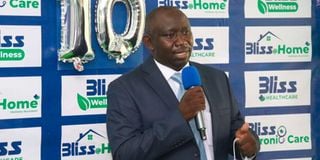How Bliss Healthcare using telemedicine to bridge health gap

Dr Gabriel Njue, Bliss Healthcare Chief Operating Officer, speaking during the facility's 10th anniversary celebrations in Nairobi.
What you need to know:
- The healthcare service provider which was incorporated in 2012 learned a vital lesson on innovation from the disruptions that Covid-19.
- To access the services, the patient has to be registered in the Bliss Healthcare system to book a consultation with a doctor.
As Covid-19 ravaged the world and decimated entire health systems, a noble innovation, telemedicine was taking root.
With limited physical contact between people, hospital visits went down significantly, and most of the developed nations saw telemedicine as their answer to travel and social restrictions occasioned by Covid-19.
Telemedicine involves the remote diagnosis and treatment of patients through the use of telecommunications technology such as telephone or exchange of information through video or images.
While it seemed to work in Europe and America, it was a nascent technology with slow adoption in sub Saharan Africa, where the population is predominantly rural.
In Kenya, 70% of the population lives in rural areas according to World Bank data. Although the country has a huge and underserved population with poor access to medical experts, it lacks a sustained telemedicine practice.
This is what inspired Bliss Healthcare, the largest integrated network of outpatient medical centers in Kenya, to launch their telemedicine project.
“The Covid pandemic and remote working served as a trigger for rethinking how Bliss Healthcare was serving its clients. This is what led to the introduction of our telemedicine project - whereby we remotely deliver healthcare services through digital technology,” says Dr Gabriel Njue, Bliss Healthcare Chief Operating Officer.
Bliss Healthcare is a front runner in the use of innovation to improve access to quality and affordable healthcare.
Its telemedicine services are anchored on serving patients in the Chronic Disease Management program who are already diagnosed and are in need of constant supply of medication and periodic doctor consultations.
So far, Dr. Njue says that through telemedicine services, Bliss Healthcare patients have been able to access medical services faster and from the comfort of their homes or offices, inevitably saving on valuable time and transportation costs.
The healthcare service provider which was incorporated in 2012 learned a vital lesson on innovation from the disruptions that Covid-19 brought to the fore, including social distancing and remote work.
For good measure, a survey by McKinsey and Company shows that 76% of consumers are now more open to using virtual medical services as compared to just 11% of consumers that used telehealth services in 2019.
Taking this cue, Bliss Healthcare telemedicine service, which includes teleconsultation, telelab, nutritional counseling and patient education/support groups serves hundreds of patients on a daily basis.
To access the services, the patient has to be registered in the Bliss Healthcare system to book a consultation with a doctor. Once the booking is logged into the system, a doctor from the telemedicine team calls the patient and diagnoses him or her remotely.
However, if the doctor feels that there is need for a physical exam, a first responder is sent to review the patient wherever they are, pick samples for testing if necessary and provide feedback once the tests have been conducted.
“In some instances, we send patients to the nearest medical center for medical examination,” says Dr. Njue.
Telemedicine is slowly gaining traction and since launching their telemedicine project a little over a year ago, Bliss Healthcare, which has over 70 outlets spread over 38 counties and serves over 80,000 patients every month, reports that each telemedicine doctor attends to approximately 40 patients in a day.
Over 25,000 patients have enrolled in it so far, and 12% of these have teleconsulted and paid using health insurance. Dr Njue shares his delight in seeing the healthcare provider expanding its reach and attending to patients in remote and far-flung areas.
“We are breaking physical barriers as we are able to consult with patients in Marsabit, Maralal, Kakuma and other remote areas. These patients can get the same level of quality services as patients in Nairobi. Besides, immobile patients can easily access healthcare services at the touch of a button,” he says.





